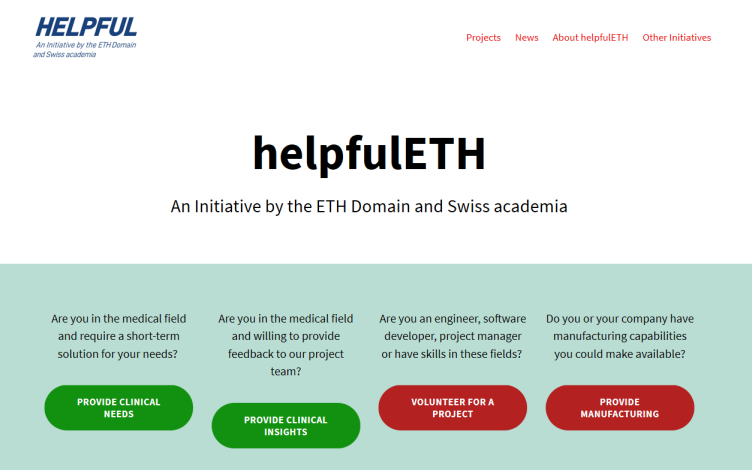Engineering solutions to combat the coronavirus crisis
The two technical universities in the ETH Domain are launching a new initiative, “helpfulETH”. Its goal is to provide solutions for hospitals and other healthcare bodies to help them deal with the acute problems presented by the coronavirus epidemic.

The outbreak of the coronavirus pandemic has caused massive upheaval to the daily routine of hospitals and other healthcare bodies such as nursing homes. This not only affects patients, but also the working practices of doctors and healthcare professionals who are exposed to completely new risks in their everyday work. Procedures that used to run like clockwork need to be reviewed, and sometimes there is simply a lack of equipment or instruments to perform routine tasks under the new conditions. This is where helpfulETH comes in, a joint research initiative between ETH Zurich and EPF Lausanne, officially launched today.
Engineering solutions for clinics
helpfulETH supplies the engineering expertise for the rapid development of solutions to problems faced by healthcare organisations as a result of the current COVID-19 pandemic. Whether medical equipment or other technical resources, information technology, data and risk analysis, or even supply chain management: healthcare professionals can use the new website to report their needs for various medical equipment or describe their problems.
“One condition for requests is that anyone reporting a requirement must have official authorisation from their organisation. In other words, they should have the authority to test and implement solutions within their particular organisation,” says Dr Stephan Fox, who leads ETH Zurich’s Feasibility Lab for Healthcare Innovation, where the idea for this type of support originated. “For us, it’s important that the products and services which we develop actually find practical use in daily medical care.”
Combined power of ETH and EPFL
The Feasibility Lab was founded in January 2020 by Mirko Meboldt, Professor for Product Development and Engineering Design, together with Detlef Günther, Vice President for Research at ETH Zurich. “ETH has been working with hospitals and clinics for some years now, helping them to develop solutions for their daily clinical activities,” Günther explains as the background to the initiative. At the end of last year, he and Meboldt decided to institutionalise this initiative by setting up a new laboratory. Initial projects had already started, and then came the coronavirus crisis. “We responded immediately and decided to concentrate our efforts entirely on the new requirements of the healthcare sector.” Suddenly the focus was no longer on long-term solutions: “Now the main purpose of our projects is to come up with solutions for current needs within a matter of days or weeks – we’re even talking about stop-gap solutions,” Meboldt explains.
At the same time, ETH’s sister university EPF Lausanne has launched projects and initiatives working in the same direction. Through the Swiss Scientific COVID-19 Task Force, Günther had already had contact with Andreas Mortensen, his opposite number at EPFL. “It was immediately clear to us that we could achieve more if we pooled our resources,” he says. helpfulETH is an initiative supported by both universities. In Lausanne, activities are overseen by David Atienza Alonso, head of the Embedded Systems Laboratory (ESL) in the Institute of Electrical Engineering at EPFL.
The helpfulETH initiative already brings together around 100 researchers – mainly from engineering disciplines – students, medics and also industry partners from both ETH Zurich and EPF Lausanne. “But other universities are welcome to join in,” Günther stresses.
How helpfulETH works

A recruitment team assesses all requirements received in terms of the urgency, technical feasibility and range of impact, and also checks whether the relevant resources are available on the network. “We must reserve the right to turn down projects sometimes if we think they do not meet these criteria,” Fox cautions.
Having identified suitable projects, the team then identifies a project manager and supports them in putting together a project team from the helpfulETH pool of volunteers. The project team works closely with the representatives of healthcare institutions to come up with an appropriate solution. In doing so, it can benefit from the know-how of experts in their particular field, for instance in tackling legal or regulatory issues.
Production facilities at ETH
ETH is currently making the Makerspace in the Student Project House available for implementing project solutions. This is equipped with 3D printers, laser cutters, etc. and is manned by students – obviously respecting all the relevant rules on social distancing. Work is now continuing here 12 hours a day, in three separate shifts. The Department of Architecture is also making its infrastructure available for projects. Wyss Zurich also offered its infrastructure for the initiative’s use as well.
Finding a solution is an iterative process. An initial prototype, such as a face mask covering the entire face, is produced in the laboratories and passed on to the clinics. How these masks are used is then filmed in the hospital and the recording sent back to the project team, who refine the product to the point where it performs its function effectively. Once that stage has been reached, the new product can be made available to all members of the Swiss healthcare community via the helpfulETH website.
A dozen projects already under way
Just over a dozen projects are already in progress, including three that are almost ready to be rolled out if everything goes to plan. Many other requirements have already been reported and are being reviewed. “But we could still do with more help,” says Stephan Fox and calls on anyone who wants to contribute their expertise to get in touch via the website.
Comments
No comments yet